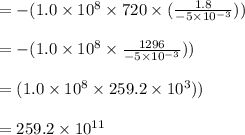
Engineering, 16.10.2020 09:01 Avibx8x8
Compute the number of kilograms of hydrogen that pass per hour through a 5-mm-thick sheet of palladium having an area of 0.20 m^2 at 500°C. Assume a diffusion coefficient of 1.0 x 10^8 m^2 /s, that the concentrations at the high- and low-pressure sides of the plate are 2.4 and 0.6 kg of hydrogen per cubic meter of palladium, and that steady-state conditions have been attained.

Answers: 1
Another question on Engineering

Engineering, 03.07.2019 14:10
The y form of iron is known as: a) ferrite b) cementite c) perlite d) austenite
Answers: 3

Engineering, 04.07.2019 18:10
Carbon dioxide gas expands isotherm a turbine from 1 mpa, 500 k at 200 kpa. assuming the ideal gas model and neglecting the kinetic and potential energies, determine the change in entropy, heat transfer and work for each kilogram of co2.
Answers: 2

Engineering, 04.07.2019 18:10
Compute the pressure drop of 30°c air flowing with a mean velocity of 8 m/s in a circular sheet-metal duct 300 mm in diameter and 15 m long. use a friction factor, f 0.02, and pair = 1.1644 kg/m a. 37.26 pa b. 25.27 pa n c. 29.34 pa d. 30.52 pa
Answers: 1

Engineering, 04.07.2019 18:20
Aquick transition of the operating speed of a shaft from its critical speed will whirl amplitude. (a) increase (b) limit (c) not affect (d) zero
Answers: 2
You know the right answer?
Compute the number of kilograms of hydrogen that pass per hour through a 5-mm-thick sheet of palladi...
Questions

Spanish, 04.12.2020 23:20

Social Studies, 04.12.2020 23:20


Mathematics, 04.12.2020 23:20

Mathematics, 04.12.2020 23:20


Law, 04.12.2020 23:20

Mathematics, 04.12.2020 23:20

Mathematics, 04.12.2020 23:20


World Languages, 04.12.2020 23:20

Biology, 04.12.2020 23:20

Mathematics, 04.12.2020 23:20


Mathematics, 04.12.2020 23:20

Mathematics, 04.12.2020 23:20

Mathematics, 04.12.2020 23:20



 ".
". 











